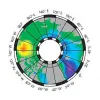
A new study has revealed a rapid response between global temperature and ice volume/sea-level, which could lead to sea-levels rising by over one metre.
During the last few million years, global ice-volume variability has been one of the main feedback mechanisms in climate change, because of the strong reflective properties of large ice sheets.…

Scientists have developed a new approach for evaluating past climate sensitivity data to help improve comparison with estimates of long-term climate projections developed by the Intergovernmental Panel on Climate Change (IPCC).
The sensitivity of global temperature to changes in the Earth’s radiation balance (climate sensitivity) is a key factor…

A new study indicates that burning all the Earth’s reserves of fossil fuels could alone cause sea levels to rise by as much as five metres – with levels continuing to rise for typically 500 years after carbon dioxide emissions ceased.
Climate change, including sea level rise, is usually discussed in the context of the next 100 years – the various…

The earliest ocean measurements from 135 years ago used alongside the most up-to-date technology, confirm that ocean temperatures, particularly in the Atlantic, have increased since Victorian times.
The voyage of the sailing ship HMS Challenger from 1872 to 1876 was the first dedicated to ocean research on a global scale. Records taken then…

A bulge of freshwater has been building up in the Arctic Ocean.
Scientists at the National Oceanography Centre have been working with the Centre for Polar Observation and Modelling at University College London to study the freshwater, which has been building up in the Beaufort Sea, a part of the western Arctic Ocean.
The freshwater mainly…

Future changes in the climate of the Arctic Ocean – and their possible impact on the climate of the United Kingdom and globally – are the subject of a major new study, supported by a £2.4 million grant from the UK’s Natural Environment Research Council (NERC).
The Arctic is the fastest-warming region of the planet. The summer sea ice melt-back has…

A unique, round-the-world sailing expedition that will monitor the marine environment in all the Earth’s oceans, starts from La Spezia, Northern Italy on Saturday 24 September.
The yacht, Kaitek will circumnavigate the globe on a four-year voyage gathering data for oceanographic research. The project was conceived by Environmental Ocean…

Using sophisticated methods of dating rocks, a team including University of Southampton researchers based at the National Oceanography Centre, Southampton, have pinned down the timing of the start of an episode of an ancient global warming known as the Paleocene-Eocene thermal maximum (PETM), with implications for the triggering mechanism.
The…

Ongoing climate-driven changes to the Arctic sea-ice could have a significant impact on the blooming of tiny planktonic plants (phytoplankton) with important implications for the Arctic ecosystem, according to new research conducted by scientists at the UK’s National Oceanography Centre (NOC).
“Ice-edge phytoplankton blooms in the Arctic Ocean…

Scientists are unravelling the environmental changes that took place around the Arctic during an exceptional episode of ancient global warming. Newly published results from a high-resolution study of sediments collected on Spitsbergen represent a significant contribution to this endeavour.
The study was led by Dr Ian Harding and Prof John Marshall…